
Leave message
Can’t find what you’re looking for?
Fill out this form to inquire about our custom protein services!
Inquire about our Custom Services >>


































 Limited Edition Golden Llama is here! Check out how you can get one.
Limited Edition Golden Llama is here! Check out how you can get one.  Limited Edition Golden Llama is here! Check out how you can get one.
Limited Edition Golden Llama is here! Check out how you can get one.
 Offering SPR-BLI Services - Proteins provided for free!
Offering SPR-BLI Services - Proteins provided for free!  Get your ComboX free sample to test now!
Get your ComboX free sample to test now!
 Time Limited Offer: Welcome Gift for New Customers !
Time Limited Offer: Welcome Gift for New Customers !  Shipping Price Reduction for EU Regions
Shipping Price Reduction for EU Regions
> Kits de dosage ELISA pour l'analyse quantitative des anticorps thérapeutiques dans les échantillons de sérum
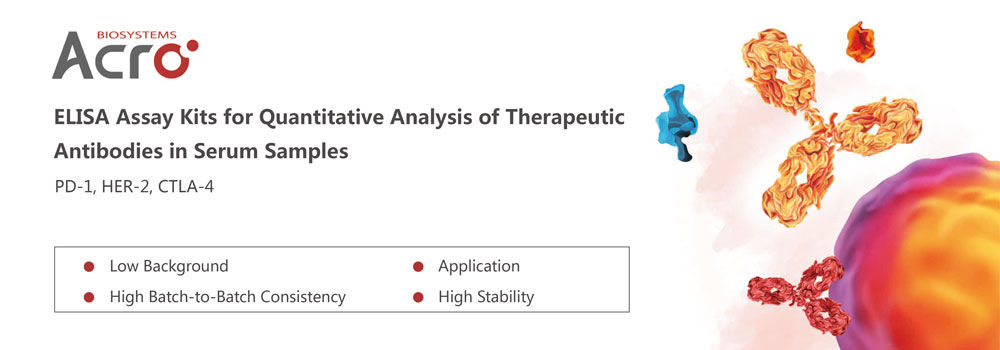
La pharmacocinétique (PK) est une branche de la science consacrée à l'analyse quantitative de l'absorption, de la distribution, du métabolisme et de l'excrétion des molécules de médicaments dans le corps d'un organisme vivant. Toutes les études précliniques et cliniques comprennent la mesure de la concentration sérique du médicament, tant chez les animaux que chez les patients, à différents moments après l'administration du médicament. Le résultat est un indicateur important des propriétés pharmacocinétiques du médicament, et il est pertinent pour les recommandations de dosage.
L'essor du marché des médicaments biologiques, stimulé par le succès des anticorps monoclonaux, rend nécessaire la mise en place de tests standardisés à haut débit pour évaluer la teneur des échantillons de sérum en anticorps monoclonaux. Traditionnellement, les analyses sont réalisées par ELISA indirect, ou à l'aide d'anticorps anti-médicaments (ADA), chacun ayant ses propres avantages et inconvénients. Nous avons développé une série de tests basés sur la méthode ELISA compétitive. Le test utilise un AcM biotinylé contre la même cible comme traceur pour entrer en compétition avec l'analyte non marqué, et utilise l'interaction entre la biotine et la streptavidine pour la lecture éventuelle. Cette méthode ne repose pas sur les ADA, et elle permet également d'atténuer le problème de bruit de fond souvent rencontré avec le format de test traditionnel.
Nous avons lancé des kits pour les études sur CTLA-4, PD-1 et HER-2, respectivement, chez l'homme et chez les animaux de laboratoire habituels.
| Cat. N° | Description du produit | Taille |
|---|---|---|
| EPH-V1 | ELISA Assay Kit for Anti-PD-1 h-mAb in Human Serum | 96/480 tests |
| EHM-V1 | ELISA Assay Kit for Anti-HER-2 h-mAb in Mouse Serum | 480 tests |
The serum samples contain many factors that may potentially interfere with the indirect ELISA result. This is the major reason for the background issue (Fig. 1A). Therefore, a series of testing need to be performed to determine the minimum required dilution (MRD) before an experiment can be conducted. This can be time consuming and the results can vary. On the other hand, the competitive ELISA method we employed for our kit does not have a background issue. As shown in Fig 1B, dilutions up to 1:5 does not produce any background at all.
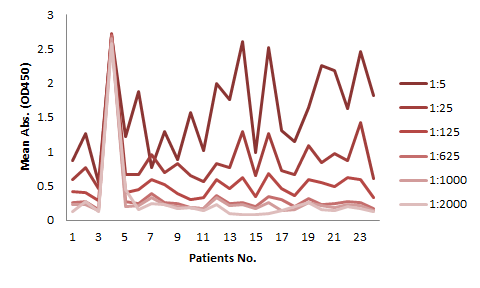
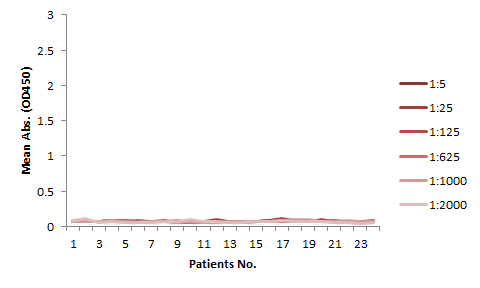
The assay kits can be used for studies of any mAbs share similar binding domain as our tracer biotinylated antibody.
For example, with our Anti-PD-1 mAb kit for human serum samples(Cat. No. EPH-V1), we have successfully measured five different anti-PD1 mAbs that are either on the market already or being tested in clinical trials.
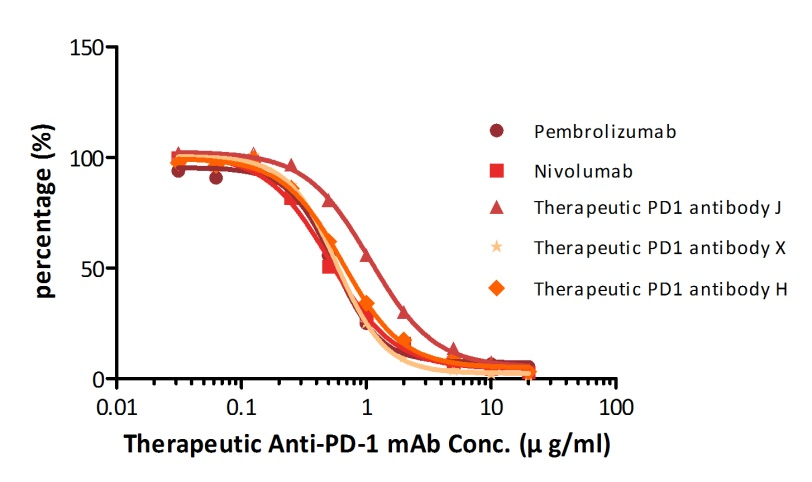
| Name | Pembrolizumab | Nivol*mab | Therapeutic PD-1 Antibody J, Human IgG4 | Therapeutic PD-1 Antibody X, Human IgG4 | Therapeutic PD-1 Antibody H, Human IgG4 |
|---|---|---|---|---|---|
| Detection Range (μg/ml) | 0.03125-20 | 0.03125-20 | 0.03125-20 | 0.03125-20 | 0.03125-20 |
| Sensitivity (μg/ml) | 0.15625 | 0.15625 | 0.15625 | 0.15625 | 0.15625 |
| %Recovery | 88-113 | 92-114 | 86-114 | 96-112 | 87-106 |
We install rigorous quality control program to ensure the lot-to-lot consistency of our products. Every batch of products are analyzed against our internal standards using various analytical methods. The product will be released only if all standards are met.
All kits components are analyzed for their stability using accelerated testing method. Based on the results shown in Fig. 3, the products can be stored at -80 for 4-6 months. The assay components are also tested after one or two freeze-thaw cycles. No significant activity loss was observed under either conditions.
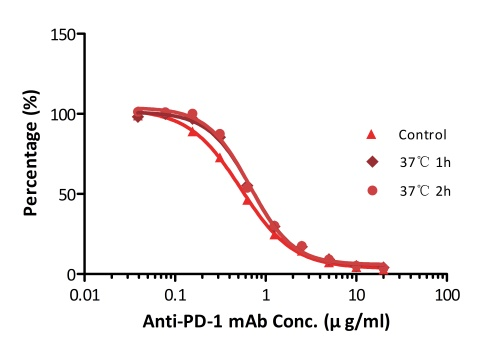
Fig. 3 ELISA using Anti-PD-1 h-mAb kit Human Serum (Cat. No. EPH-V1). The samples were incubated at 37℃ for 2 hours after reconstitution. No significant loss of activity was observed.
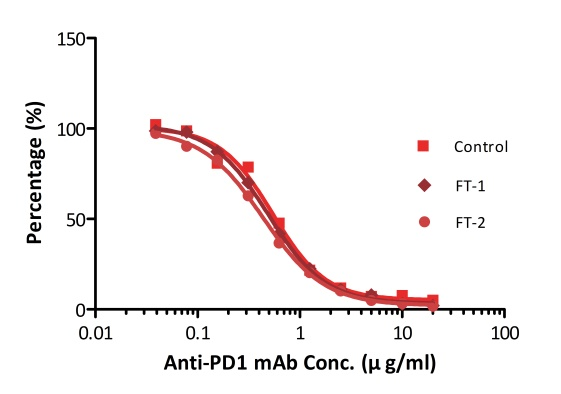
Fig. 4 ELISA using Anti-PD-1 h-mAb kit Human Serum (Cat. No. EPH-V1). The samples were subjected to zero, one, and two rounds of freeze-thawing cycles, respectively. No significant loss of activity was observed.
This web search service is supported by Google Inc.








